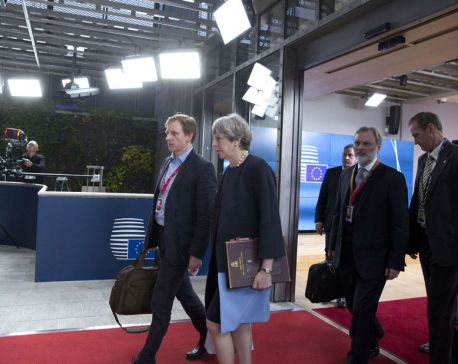
OR
Going into the Dashain break, there have been some happy tidings. The all-important local elections are now complete, all three phases of them, which is a huge milestone towards the implementation of the new constitution. The successful holding of the local elections, with an average national turnout of around 75 percent of all eligible voters, is a big fillip for the health of the fledging Nepali democracy, and augurs well for the upcoming two-phase provincial and federal elections on November 26 and December 7. Successful local elections have certainly reenergized the dormant democratic process and infused Nepalis with new hope. There have also been some encouraging developments on anti-corruption with the twin sackings of Gopal Khadka (from the post of managing director of Nepal Oil Corporation) and Dolindra Prasad Sharma (as chairman and GM of Sajha Prakashan), in part thanks to a relentless crusade against them by Republica and its sister publication Nagarik. For a people long used to state inaction on corruption, and almost inured to corruption in high places, these sackings will come as unexpected festive gifts. The national economy is also on a firmer footing compared to this time a year ago.
Yet there are also reasons for concern. Dr Govinda KC has just started his 12th fast-unto-death after the parliament surreptitiously tried to pass the legislation to undo nearly all the medical education reforms that were in the pipeline. Dr KC’s dream of bringing cheap and reliable healthcare to the doorstep of each and every Nepali has thus been badly interrupted. Medical doctors, likewise, went on a nationwide strike against a proposed bill to rein in medical malpractice, depriving hundreds of thousands of people essential medical care. Another piece of legislation has decimated our community schools and public education. Even the local elections were not without controversy. The Election Commission allowed blatant violation of election code of conduct, its role limited to issuing impotent warnings that political parties easily ignored. We are afraid Ayodhee Prasad Yadav has proven to be an extremely weak chief election commissioner, easily amenable to political pressure. The power of money and muscle was also in ample evidence in all three phases of local elections, which undercut their legitimacy to a degree. Again, a stronger and more independent commission would have helped.
With Dr KC fighting for his life, and hospitals around the country effectively shut should anything untoward happen to their health, Nepalis will feel a little uncomfortable this festive season. Nor will they be convinced of progress in corruption-control so long as proven corrupt civil servants like Lokman Singh Karki, NOC’s Khadka and Sajha’s Sharma are not brought to justice. Yet at the start of this festive season—Dashain, Tihar and Chhat all coming in quick succession—Nepalis have many more reasons to be hopeful than they did at the same time last year, when the fate of the constitutionally mandated three sets of elections seemed as uncertain as ever. And it is with this hope that they will now look forward to the two remaining elections. As we wish all our valued readers happy festivities, we are also hopeful that despite the many hurdles to the institutionalization of the nascent Nepali democracy, we are getting there, albeit in fits and starts.
You May Like This

Guarded hope
New left alliance ... Read More...

Prem Geet 2: Hope for true love, hope for better films
Though set in Burma, ‘Prem Geet 2’ from the very start talks about nationalism and tries to promote the rich... Read More...

Brexit: May offers hope for EU citizens, wins guarded praise
BRUSSELS, June 23: British Prime Minister Theresa May promised Thursday that EU citizens will not be immediately kicked out of... Read More...





Just In
- MoHP cautions docs working in govt hospitals not to work in private ones
- Over 400,000 tourists visited Mustang by road last year
- 19 hydropower projects to be showcased at investment summit
- Global oil and gold prices surge as Israel retaliates against Iran
- Sajha Yatayat cancels CEO appointment process for lack of candidates
- Govt padlocks Nepal Scouts’ property illegally occupied by NC lawmaker Deepak Khadka
- FWEAN meets with President Paudel to solicit support for women entrepreneurship
- Koshi provincial assembly passes resolution motion calling for special session by majority votes






_20220508065243.jpg)






Leave A Comment